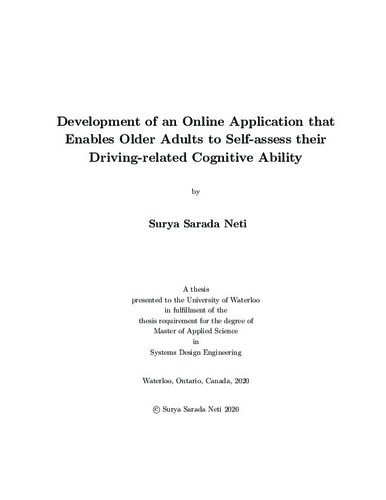| dc.contributor.author | Neti, Surya Sarada | |
| dc.date.accessioned | 2020-09-01 19:59:48 (GMT) | |
| dc.date.available | 2020-09-01 19:59:48 (GMT) | |
| dc.date.issued | 2020-09-01 | |
| dc.date.submitted | 2020-08-19 | |
| dc.identifier.uri | http://hdl.handle.net/10012/16217 | |
| dc.description.abstract | Our cognitive abilities can change as we age and these changes may reduce our ability to
perform day to day activities, one of which is driving. Older adults with mild cognitive
impairment or mild dementia have been shown to have a higher number of crashes per
mile driven and are more vulnerable to injuries due to frailty. Driving cessation,
however, not only curtails mobility but can cause social isolation and depression among
older adults; this is especially true in countries like Canada that have relatively long
driving distances and dependency on cars for transit. Driving is often synonymous with
independence and hence any discussion about it requires careful consideration by
physicians, family, and most importantly the drivers themselves. Motivated by the need
to balance road safety and autonomy, this study aims to create and evaluate SmartDrive,
which is a digital application that helps refocus the discussion about driving in a way
that empowers the older adult. Developed using participatory design methods,
SmartDrive is an online, self-assessment application that implements a collection of
validated cognitive tasks that have been correlated with on-road driving performance
namely, Trail Making Test (Part B), Porteus Mazes & Useful Field of View (subdivided
attention). The objective of SmartDrive is to provide the older adult with accurate and
useful feedback on their driving-related cognitive abilities in order to promote informed
and safer driving decisions.
The results from iterative testing of SmartDrive indicated a high acceptance of the
app among older adults. The primary motivator for using the app was the need to
monitor age-related cognitive decline and its effects on safe driving. Qualitative analysis
of the semi-structured interviews conducted with 24 older adult drivers revealed themes
that captured the preferred design features and underlying user characteristics that
influenced the adoption of SmartDrive. The themes and sub-themes that were identified
in this research contribute to the current usability frameworks and can be used as a
guide for the development of other web-based applications that support older adults in
self-assessment and periodic monitoring of different skills. | en |
| dc.language.iso | en | en |
| dc.publisher | University of Waterloo | en |
| dc.subject | driving | en |
| dc.subject | dementia | en |
| dc.subject | self-assessment | en |
| dc.title | Development of an Online Application that Enables Older Adults to Self-assess their Driving-related Cognitive Ability | en |
| dc.type | Master Thesis | en |
| dc.pending | false | |
| uws-etd.degree.department | Systems Design Engineering | en |
| uws-etd.degree.discipline | System Design Engineering | en |
| uws-etd.degree.grantor | University of Waterloo | en |
| uws-etd.degree | Master of Applied Science | en |
| uws.contributor.advisor | Boger, Jennifer | |
| uws.contributor.affiliation1 | Faculty of Engineering | en |
| uws.published.city | Waterloo | en |
| uws.published.country | Canada | en |
| uws.published.province | Ontario | en |
| uws.typeOfResource | Text | en |
| uws.peerReviewStatus | Unreviewed | en |
| uws.scholarLevel | Graduate | en |

